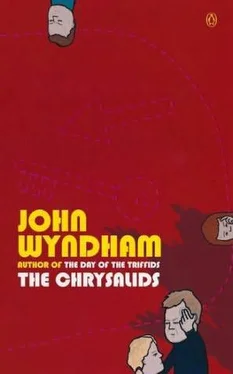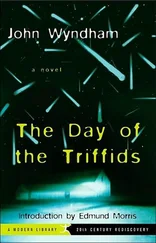I had run a splinter into my hand and when I pulled it out it bled a lot. I went to the kitchen with it only to find everybody too busy getting supper to be bothered with me, so I rummaged a strip out of the rag-drawer for myself. I tried clumsily for a minute or two to tie it, then my mother noticed. She made tchk-tchk noises of disapproval and insisted on it being washed. Then she wound the strip on neatly, grumbling that of course I had to go and do it just when she was busy. I said I was sorry, and added:
‘I could have managed it all right by myself if I’d had another hand.’
My voice must have carried, for silence fell on the whole room like a clap.
My mother froze. I looked round the room at the sudden quiet. Mary, standing with a pie in her hands, two of the farm men waiting for their meal, my father about to take his seat at the head of the table, and the others; they were all staring at me. I caught my father’s expression just as it was turning from amazement to anger. Alarmed, but uncomprehending, I watched his mouth tighten, his jaw come forward, his brows press together over his still incredulous eyes. He demanded:
‘What was that you said, boy?’
I knew the tone. I tried to think in a desperate hurry how I had offended this time. I stumbled and stuttered.
‘I — I said I couldn’t manage to tie this for myself,’ I told him.
His eyes had become less incredulous, more accusing.
‘And you wished you had a third hand!’
‘No, father. I only said if I had another hand…’
‘… you would be able to tie it. If that was not a wish, what was it?’
‘I only meant if,’ I protested. I was alarmed, and too confused to explain that I had only happened to use one way of expressing a difficulty which might have been put in several ways. I was aware that the rest had stopped gaping at me, and were now looking apprehensively at my father. His expression was grim.
‘You — my own son — were calling upon the Devil to give you another hand!’ he accused me.
‘But I wasn’t. I only—’
‘Be quiet, boy. Everyone in this room heard you. You’ll certainly make it no better by lying.’
‘But—’
‘Were you, or were you not, expressing dissatisfaction with the form of the body God gave you — the form in His own image?’
‘I just said if I—’
‘You blasphemed, boy. You found fault with the Norm. Everybody here heard you. What have you to say to that? You know what the Norm is?’
I gave up protesting. I knew well enough that my father in his present mood would not try to understand. I muttered, parrot-like:
‘“The Norm is the Image of God”.’
‘You do know — and yet, knowing this, you deliberately wished yourself a Mutant. That is a terrible thing, an outrageous thing. You, my son, committing blasphemy, and before his parents!’ In his sternest pulpit voice, he added:
‘What is a Mutant?’
‘“A thing accursed in the sight of God and man”,’ I mumbled.
‘And that is what you wished to be! What have you to say?’
With a heart-sunk certainty that it would be useless to say anything, I kept my lips shut and my eyes lowered.
‘Down on your knees!’ he commanded. ‘Kneel and pray!’
The others all knelt, too. My father’s voice rose:
‘Lord, we have sinned in omission. We beg Thy forgiveness that we have not better instructed this child in Thy laws…’ The prayer seemed to go booming on for a long time. After the ‘Amen’ there was a pause, until my father said:
‘Now go to your room, and pray. Pray, you wretched boy for a forgiveness you do not deserve, but which God, in His mercy, may yet grant you. I will come to you later.’
In the night, when the anguish which had followed my father’s visit was somewhat abated, I lay awake, puzzling. I had had no idea of wishing for a third hand, but even if I had. . .? If it was such a terrible thing just to think of having three hands, what would happen if one really had them — or anything else wrong; such as, for instance, an extra toe —?
And when at last I fell asleep I had a dream. We were all gathered in the yard, just as we had been at the last Purification. Then it had been a little hairless calf that stood waiting, blinking stupidly at the knife in my father’s hand; this time it was a little girl, Sophie, standing barefooted and trying uselessly to hide the whole long row of toes that everyone could see on each foot. We all stood looking at her, and waiting. Presently she started to run from one person to another, imploring them to help her, but none of them moved, and none of their faces had any expression. My father started to walk towards her, the knife shining in his hand. Sophie grew frantic; she flitted from one unmoving person to another, tears running down her face. My father, stern, implacable, kept on coming nearer; still no one would move to help her. My father came closer still, with long arms outspread to prevent her bolting as he cornered her.
He caught her, and dragged her back to the middle of the yard. The sun’s edge began to show above the horizon, and everyone started to sing a hymn. My father held Sophie with one arm just as he had held the struggling calf. He raised his other hand high, and as he swept it down the knife flashed in the light of the rising sun, just as it had flashed when he cut the calf’s throat….
If John and Mary Wender had been there when I woke up struggling and crying, and then lay in the dark trying to convince myself that the terrible picture was nothing more than a dream, they would, I think, have felt quite a lot easier in their minds.
This was a time when I passed out of a placid period into one where things kept on happening. There wasn’t much reason about it; that is to say, only a few of the things were connected with one another: it was more as if an active cycle had set in, just as a spell of different weather might come along.
My meeting with Sophie was, I suppose, the first incident; the next was that Uncle Axel found out about me and my half-cousin, Rosalind Morton. He — and it was lucky it was he, and no one else — happened to come upon me when I was talking to her.
It must have been a self-preserving instinct which had made us keep the thing to ourselves, for we’d no active feeling of danger - I had so little, in fact, that when Uncle Axel found me sitting behind a rick chatting apparently to myself, I made very little effort to dissemble. He may have been there a minute or more before I became aware of somebody just round the corner of my eye, and turned to see who it was.
My Uncle Axel was a tall man, neither thin nor fat, but sturdy, and with a seasoned look to him. I used to think when I watched him at work that his weathered hands and forearms had some sort of kinship with the polished wood of the helves they used. He was standing in his customary way, with much of his weight upon the thick stick he used because his leg had been wrongly set when it was broken at sea. His bushy eyebrows, a little touched with grey, were drawn closer by a half-frown, but the lines on his tanned face were half-amused as he regarded me.
‘Well, Davie boy, and who would you be chattering away so hard to? Is it fairies, or gnomes, or only the rabbits?’ he asked.
I just shook my head. He limped closer, and sat down beside me, chewing on a stalk of grass from the rick.
‘Feeling lonely?’ he inquired.
‘No,’ I told him.
He frowned a bit again. ‘Wouldn’t it be more fun to do your chattering with some of the other kids?’ he suggested. ‘More interesting than just sitting and talking to yourself?’
I hesitated, and then because he was Uncle Axel and my best friend among the grown-ups, I said:
Читать дальше












